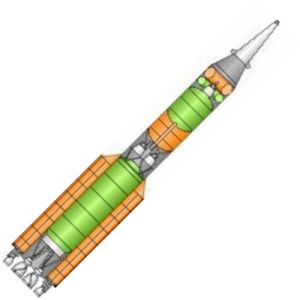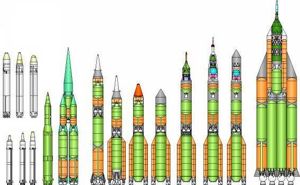Polyblock UR-500 (original) (raw)

Home - Search - Browse - Alphabetic Index: 0- 1- 2- 3- 4- 5- 6- 7- 8- 9
A- B- C- D- E- F- G- H- I- J- K- L- M- N- O- P- Q- R- S- T- U- V- W- X- Y- Z
Polyblock UR-500

UR-500 Polyblock
The original selected UR-500 'polyblock' configuration. This had the advantage of a much shorter vehicle than the conventional design, with a slight but acceptable weight penalty. The original vehicle would use four large fixed Glushko RD-253 motors surrounded by four smaller gimballed UR-200 motors. During development this was abandoned in favour of six Glushko motors, making for an even simpler and more compact vehicle.
Credit: © Mark Wade
UR-500 design studies considered two variants of the first stage: polyblock and monoblock. The polyblock variant consisted of a center large diameter oxidizer tank surrounded by several smaller diameter fuel tanks. This version could be assembled in a special rig with the lateral blocks being sequentially mounted on the center. In January 1962 this design was chosen as most advantageous, following studies that indicated improved wind loads and bending moment characteristics compared to the monoblock design. The developed version of the design would become known as the Proton.
Status: Design 1962. Payload: 12,000 kg (26,000 lb). Thrust: 8,119.80 kN (1,825,404 lbf). Gross mass: 554,940 kg (1,223,430 lb). Height: 43.00 m (141.00 ft). Diameter: 4.10 m (13.40 ft). Apogee: 200 km (120 mi).
This had the advantage of easier installation of the upper stages and payload due to the smaller length of the first stage. This variant was studied in Filial 1 under the lead engineer E. T. Radchenko. The polyblock design received patent number 36616 in 26 July 1966. Named on the patent were V N Chelomei, V N Bugayckiy, V A Birodov, G D Dermichev, N I Yegorov, V K Karrask, Yu P Kolesnikov, Ya B Nodelman, and E T Radchenko.
The design mass and engine performance figures for this version have been given; the calculated payload is 12,000 kg. This is coincidentally very close to the 12,200 kg payload mass given (incorrectly) at the time of the launch of the two-stage variant of the launch vehicle, Proton 1.
LEO Payload: 12,000 kg (26,000 lb) to a 200 km orbit.
Stage Data - Polyblock UR-500
- Stage 1. 1 x UR-500 Polyblock Stage 1P. Gross Mass: 378,900 kg (835,300 lb). Empty Mass: 26,900 kg (59,300 lb). Thrust (vac): 8,989.700 kN (2,020,965 lbf). Isp: 310 sec. Burn time: 119 sec. Isp(sl): 280 sec. Diameter: 4.10 m (13.40 ft). Span: 7.40 m (24.20 ft). Length: 21.20 m (69.50 ft). Propellants: N2O4/UDMH. No Engines: 4. Engine: 8D43 + 11D43. Status: Study 1962. Comments: Original 'Polyblock' design for Proton first stage. This was selected configuration; although somewhat greater in dry mass, it had the advantages of shorter length.
- Stage 2. 1 x UR-500 Stage 2. Gross Mass: 137,700 kg (303,500 lb). Empty Mass: 16,000 kg (35,000 lb). Thrust (vac): 3,183.200 kN (715,612 lbf). Isp: 320 sec. Burn time: 119 sec. Diameter: 4.10 m (13.40 ft). Span: 4.10 m (13.40 ft). Length: 10.90 m (35.70 ft). Propellants: N2O4/UDMH. No Engines: 4. Engine: RD-0213. Status: Study 1962. Comments: Original Proton second stage design.
- Stage 3. 1 x UR-500 Stage 3. Gross Mass: 23,940 kg (52,770 lb). Empty Mass: 2,180 kg (4,800 lb). Thrust (vac): 613.110 kN (137,833 lbf). Isp: 320 sec. Burn time: 110 sec. Diameter: 4.10 m (13.40 ft). Span: 4.10 m (13.40 ft). Length: 3.70 m (12.10 ft). Propellants: N2O4/UDMH. No Engines: 1. Engine: RD-0212. Status: Study 1962. Comments: Original Proton third stage design.
Family: orbital launch vehicle. Country: Russia. Engines: 8D43 + 11D43, RD-0212, RD-0213, 11D43, 8D43. Stages: Monoblock UR-500-2, Monoblock UR-500-3, Polyblock UR-500-1P. Agency: Chelomei bureau.
Photo Gallery
Home - Search - Browse - Alphabetic Index: 0- 1- 2- 3- 4- 5- 6- 7- 8- 9
A- B- C- D- E- F- G- H- I- J- K- L- M- N- O- P- Q- R- S- T- U- V- W- X- Y- Z
© 1997-2019 Mark Wade - Contact
© / Conditions for Use
